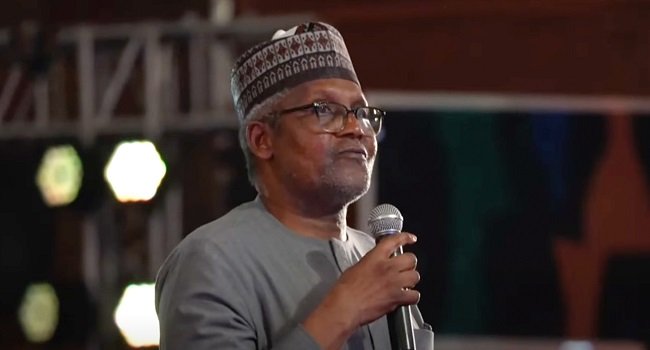AFRICA’s richest man, Aliko Dangote, has opened up about his early struggles, humble beginnings, and the trials that shaped his rise to becoming a $28 billion business magnate.
In a wide-ranging feature by Bloomberg cited by News Point Nigeria, Dangote recalled how he started his journey into business in the 1970s with a $3,000 loan from his uncle, trading in cotton, cocoa, cashew nuts, and sesame seeds before eventually moving into cement and transportation.
By the early 1990s, he revealed, he was earning just ₦7,000 to ₦8,000 a day from cement trading, a modest income that nevertheless allowed him to purchase his first Mercedes for ₦5,100.
“I was making about 7,000 to 8,000 naira per day from trading cement,” Dangote told Bloomberg. “That’s how I bought my first car.”
Dangote’s entrepreneurial instincts ran deep within his family.
His maternal great-grandfather had been one of West Africa’s richest men, trading peanuts and other goods with Britain during the colonial era. Yet Aliko carved his own path, turning modest trading into a vast industrial empire.
By 2010, Dangote Cement was listed on the Nigerian Stock Exchange with an initial valuation of $13.8 billion, instantly transforming him into one of the world’s ultrawealthy.
Over the years, his group expanded across multiple sectors, from cement and sugar to salt and now energy.
Critics have long accused Dangote of leveraging government connections to dominate industries, but he insists his success comes from spotting opportunities where others failed.
“If you are going to call first movers into business monopolists, then you will never establish a manufacturing base,” he said. “Or you’ll never establish anything that you call a country.”
In perhaps his boldest venture yet, Dangote built the world’s largest single-train oil refinery, with capacity to process 650,000 barrels per day. The $20 billion facility, located in Lagos, has already enabled Nigeria to become a net exporter of petroleum products for the first time in three decades.
Yet Dangote admits the refinery has been his toughest undertaking.
“Right from the beginning, we realized that nobody can provide us with any service. You have to provide almost everything by yourself,” he said from his Lagos mansion, where he has lived for 35 years.
“If I knew what I was going to go through, I wouldn’t have tried it.”
Despite the enormous cost and delays, the refinery is already transforming Nigeria’s energy landscape. Once it fully transitions to local crude supply later this year, it is expected to meet the nation’s entire gasoline demand while leaving room for exports.
Dangote’s career hasn’t been without controversy. In 2007, he led a consortium that attempted to buy two idle government refineries for $721 million. The sale was later reversed after opposition from unions and civil society groups, with critics accusing him of unfairly benefiting from privatizations.
Today, the same refineries remain largely non-functional, despite billions of dollars spent on rehabilitation.
Meanwhile, Dangote’s net worth has risen by $1 billion in the past three months alone, according to the Bloomberg Billionaires Index, boosted by the ramp-up of his refinery.
At 68 years old, Dangote remains a towering figure in African business, straddling cement, agriculture, energy, and philanthropy. His story from earning ₦7,000 daily in Kano to controlling billions in global assets continues to inspire and stir debate.
As he put it himself: “Some of the greatest business successes come from commodities. We just took advantage of opportunities others ignored.”







